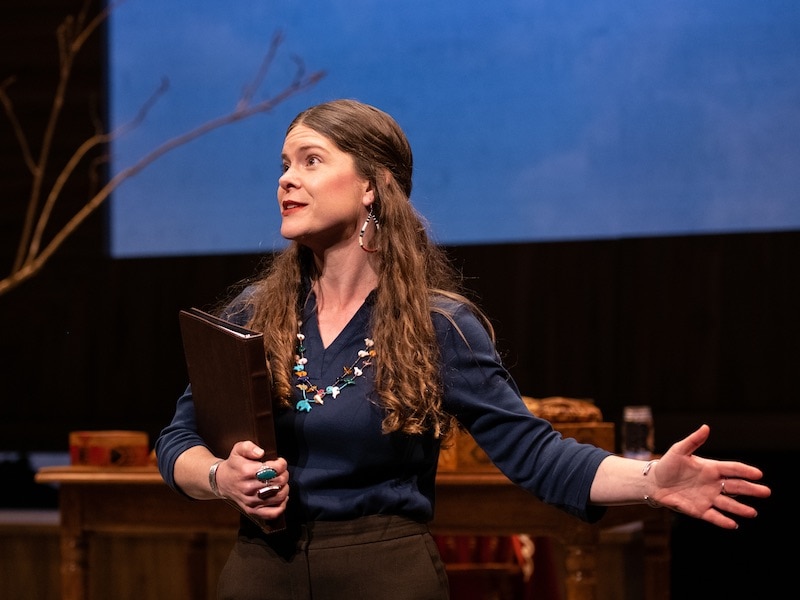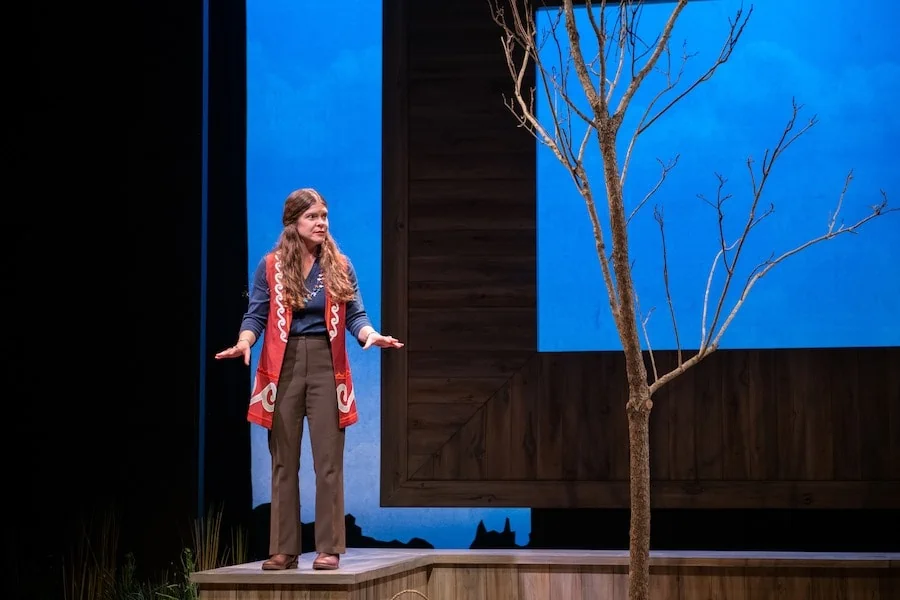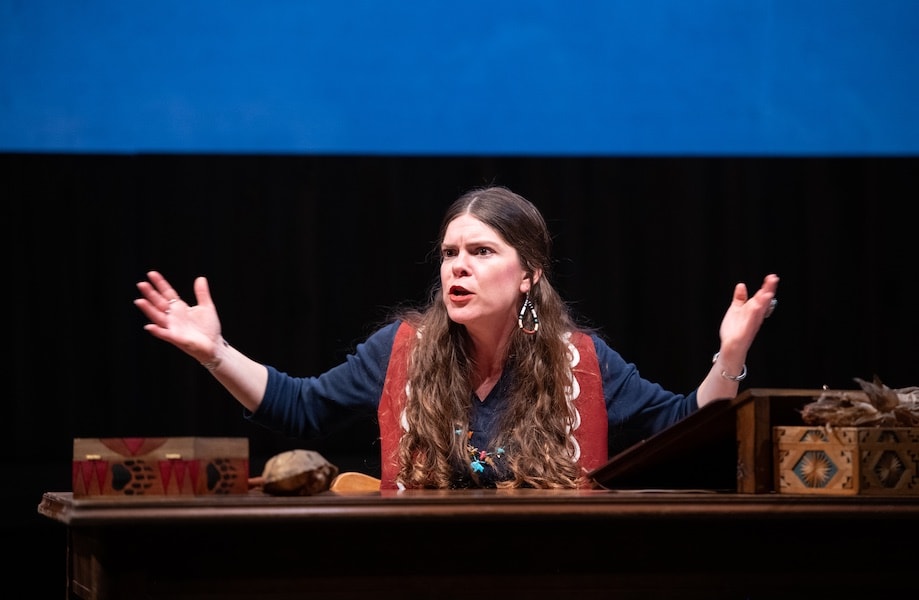It was only ten or so minutes into On the Far End when I heard the first “wow” from an audience member. It was whispered, sounding almost of disbelief. Just before, we had heard the story of a man who had walked the Trail of Tears as a child, one of only 50 to survive in a group that originally totaled around 500.
His story made it to the stage at Round House Theatre indirectly. In that moment of the play, Mary Kathryn Nagle, writer and performer of the one-woman show, is embodying her mother-in-law, Jean Hill Chaudhuri, who is in turn re-enacting her grandfather telling the story.
The direct and indirect embodiment of memories is an important aspect of On the Far End, now playing as part of Round House’s National Capital New Play Festival through May 7. Equal parts heart-rending and inspiring, Nagle’s play is powerful, even if its straightforward structure holds the play back from reaching its full potential impact.

On the Far End is, essentially, the life of Jean Hill Chaudhuri, a Muscogee leader. Nagle performs as Jean, walking us through her mother-in-law’s history in the first person. Jean recounts growing up on a reservation in Oklahoma, being forcibly taken to a Native boarding school, running away from that school, encountering constant racism and discrimination, and becoming an activist and advocate for Indigenous rights.
The title, it should be noted, comes from a Supreme Court — “your Supreme Court,” as Jean says — decision. “On the far end of the Trail of Tears was a promise,” reads the opening line of the majority opinion of McGirt v. Oklahoma (2020). The Court rarely kept its promises to Indigenous people, Jean reminds us, but this case reversed that trend, with the Court ruling that the Muscogee Nation had jurisdiction over its own reservation and that the state of Oklahoma did not.
If the promise on the far end of the Trail of Tears wasn’t truly fulfilled until 2020, then Jean’s story is of someone who fought her whole life to inch closer to fulfilling that promise. Indeed, she refers back to that theme as she moves, chronologically, from story to story throughout her life.
To be frank, though, Nagle could actually stand to hammer in those themes even more. On the Far End’s straightforward, chronological nature means that what is missing in the play is connective tissue, something to tie the play’s individual moments together and connect Jean’s stories to broader issues. We certainly get a strong sense of who Jean was and what made her so extraordinary, but less of a sense of the insight these stories could bring.

Still, despite the structural issues, On the Far End is compelling from start to finish, mostly thanks to Nagle’s writing and performance. She tells Jean’s story with a unique blend of embodiment, storytelling, and oration. Nagle never fully becomes Jean, but that choice feels purposeful, like a constant reminder that this is a story being passed down as much as it is a performance.
As directed by Margot Bordelon, Nagle also exhibits a particular knack for cadence, which keeps the play engaging, and evocative delivery, which makes Jean’s story come to life in the audience’s head. I could visualize Jean as she ran away from school, and that image was even more powerful than a recreation would have been.
The design elements assist in those particular tricks. Emma Deane’s lighting design utilizes subtle, barely noticeable shifts to enhance the tone of each story, while sound design by Emily Duncan Wilson is deployed in specific times to add to the most evocative moments. Paige Hathaway’s scenic design, meanwhile, gives Nagle plenty of variable space to move but can fade into the background when the story’s weight is enough in its own right.
The weight of the play, it is worth noting, is never lost on anyone. At one point, Jean tells the story of her own turn as a playwright. She worked with other Indigenous artists to create a performance in Oklahoma about the Trail of Tears, in hopes that confronting the experience through art would help the community to put it behind them.
In many ways, On the Far End has, understandably, the opposite goal. Here, Jean’s story is told with the goal of remembering her experiences, not to put the past behind, but to use it to drive forward. This is a story that demands to be heard and passed on.

Indeed, that demand permeated the audience on opening night — an audience that included many members of Muscogee Nation, including Principal Chief David Hill, and Justice Neil Gorsuch, who wrote the majority opinion in McGirt v. Oklahoma (2020).
McGirt, after all, inspired Nagle to write On the Far End, and although that opinion was in many ways a promise fulfilled, this play serves as a reminder that the story of how Muscogee Nation got there isn’t done being told.
Running Time: Approximately 90 minutes with no intermission.
On the Far End plays through May 7, 2023, as part of Round House Theatre’s National Capital New Play Festival, at Round House Theatre – 4545 East-West Highway, Bethesda, MD. For tickets ($46-$81 plus fees), call the box office at 240-644-1100 or go online. (Learn more about special discounts here and Free Play program for students here.)
The program for On the Far End is online here.
COVID Safety: Round House Theatre no longer requires that audience members wear masks for most performances. However, masks are required at the following On the Far End performances: April 2, 7, 15, 22, 29, and May 3. The venue’s current COVID safety policy is here.
DISCUSSIONS AND ACCESSIBILITY
View pre-show and post-show discussions here.
Native American & Indigenous Community Night: May 3
Audio-Described Performance: April 15 at 2:00 pm
Open-Captioned Performance: April 29 at 2:00pm
Learn more about accessibility at Round House here.




